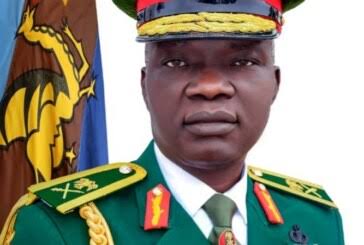Indeed, leadership has always remained a critical factor in society, particularly as Nigeria continues to grapple with emerging challenges of insecurity.
At a time when Boko Haram is waging an insurgency in the North East, banditry and kidnapping are ravaging the North West and parts of North Central, with armed robbery, kidnappings and insurrection prevailing in the South East, there is no better time to profile especially leadership that are charged with the responsibility of restoring peace and security in the country.
One man who stands out and who is providing the much desired leadership, especially in the area of security, is no other person than the country’s Chief of Army Staff, Lieutenant General Taoreed Lagbaja.
It’s on record that within the short span in office, Lieutenant General Lagbaja, with his extensive knowledge of land, airborne and amphibious warfare, particularly with his grasp of the war against terrorism and insurgency, is already beginning to make headway in the collective bit to tackle the menace posed by insecurity across the country.
Building on the successes thus far recorded by his predecessors, the new Chief of Army Staff has effectively demonstrated his preparedness for his new responsibilities, just as Lieutenant General Lagbaja continues to uncommon grasp of the current security challenges in the country and even what may come ahead.
A qualified Special Forces Officer (Airborne and Amphibious), Lieutenant General Lagbaja was born on February 28, 1968 in Ilobu, Irepodun Local Government Area, Osun State. He was admitted to the Nigerian Defence Academy in 1987 as the 39th Regular Course and was subsequently commissioned into the Nigerian Army Infantry Corps as a second lieutenant on September 19, 1992.
Between 1992 and 1995, Lagbaja was platoon commander of the 93 Battalion. From 1995 to 2001, he was platoon commander of 72 Special Forces Battalion. In 2001, Mr Lagbaja obtained a Bachelor’s degree in Geography from the Nigerian Defence Academy. He studied Strategic Studies at the US Army War College at the Master’s level.
He was an instructor at Nigerian Defence Academy between 2001 and 2004. At one time, Lieutenant General Lagbaja was a Grade 2 Staff Officer in charge of peacekeeping at the Army Headquarters Department of Army Training and Operations. Then he was a Directing Staff at Armed Forces Command and Staff College from 2006 – 2009.
By 2009, he became Deputy Chief of Staff G1 at Headquarters 81 Division and subsequently, he became Commanding Officer at 72 Special Forces Battalion Makurdi from 2012 to 2013 and 2014 to 2015. In 2016, he was named the Chief of Staff at Headquarters 8 Task Force Division, Monguno. He served as Director of Operations at the Army Headquarters Department of Army Training and Operations from January – December 2018.
He was a Commander of Headquarters 9 Brigade, Ikeja, Lagos State and Headquarters 2 Brigade, Uyo, Akwa Ibom State. Before his new appointment, Lagbaja was General Officer Commanding Headquarters 82 Division from March 2021 – August 2022 and Headquarters 1 Division – from August 2022 – June 2023. Earlier in 2008, he attended the Military Observers Course on Peacekeeping Wing at the Nigerian Army School of Infantry Jaji (February – May 2008) and ECOWAS Standby Force Battalion Command Post Course – Peacekeeping Centre, Bamako, Mali – (June – August 2010).
He also participated in Operation HARMONY IV in Bakassi Peninsula; United Nations Mission in the Democratic Republic of Congo (MONUC); Operation ZAKI Internal Security Operation in Benue State; Operation LAFIYA DOLE; Operation MESA/Operation UDO KA – March 2021 – August 2022 – Internal Security Operation in South-east Nigeria (Anambra/Abia/Ebonyi/Enugu and Imo States); and Operation FOREST SANITY – Aug 2022 to 2023 – Internal Security Operation in Kaduna/Niger States.
For his bravery and dedication to duty, he has garnered several awards both internationally and locally. He has in his kitty the Forces Service Star, Meritorious Service Star, Distinguished Service Star, Passed Staff Course (+), Fellows United States Army War College, Command Medal, Field Command Medal, Field Command Medal of Honour, General Operations Medal, Operation Harmony Medal, United Nations Peacekeeping Operation Medal and Operation LAFIYA DOLE Medal.
As a core professional, the Chief of Army Staff has deemed it necessary to immerse himself in his military career. This way he was able to prepare adequately for his new task by being an ardent student of military history which is replete with lessons and examples that he can compare to Nigeria’s present situation.
He stands out as a rare breed of military leaders who read history and who apply history regularly while discharging their duties, consciously aware that taking the time to learn from the past will increase their ability to answer the tough questions when they arise.
It’s little wonder then that Lieutenant General Lagbaja is harnessing his knowledge and experience to ensure that there is synergy between sister security agencies in the collective fight against insecurity.
“As someone who has studied military technology and history, I understand that conflicts cannot be resolved by a single branch or agency alone. Therefore, I recognize the necessity of collaborating with sister services and other security agencies.
“Fortunately, I have an advantage as the Chief of Army Staff: the other service chiefs, including the Chief of Air Staff and the Chief of Naval Staff, are my course mates. We not only attended the Nigerian Defence Academy (NDA) together, but we also trained in the same battalion and lived in the same hostel. Additionally, the Chief of Defense Staff also trained in the same battalion.
“I intend to leverage this longstanding friendship that spans over 30 years to further enhance the synergy we experienced during the tenure of the immediate past service chiefs,” the Chief of Army Staff has said.
Certainly, the current Chief of Army Staff perfectly understands that leadership is more than knowing where you are, where you want to go, and how you are going to get there.
Lieutenant General Lagbaja is therefore fully aware that for him to lead the military effectively, he must not only inspire others to join in his vision but must also take decisions, move the mission forward and lead by personal example.
His vision and philosophy for the transformation of the Nigerian Army towards the effective discharge of its constitutional mandate therefore leaves no room for doubt as to what Nigerian should expect as far as tackling issues of insecurity are concerned.
“Under my leadership as the Nigerian Chief of Army Staff, I pledge to Nigerians that we will work diligently to ensure peace and stability return to every corner of Nigeria as quickly as possible.
“My philosophy of command as the Chief of Army Staff is to transform the Nigerian Army into a well-trained, equipped, and highly effective force to fulfill our constitutional responsibilities in a joint environment,” he stated.
He further explained that his vision is not just physical but also spiritual. Lieutenant General Lagbaja is the true manifestation of those rare military top brass who take genuine interest in their subordinates, which usually translates into tangible results in terms of mission accomplishments.
“My philosophy is based on three pillars: leadership, operational effectiveness, and sound administration. I am deeply concerned about the welfare of my troops. In your research analyzing potential service chiefs prior to the announcement on June 19th, you may have come across the fact that as the General Officer Commanding, I have taken good care of my troops. I don’t just eat from the same plate; I eat from the same pit as them. I go on operations with them and I don’t assign a task without experiencing it myself. Even as the Chief Commanding Officer, I still ride a bicycle around the barracks, which I have been doing since my time as a commanding officer, brigade commander, and GOC in the Nigerian Army,” he added.
Under his leadership, the Nigerian military is steadily reaffirming its potency and thereby confronting the security challenges in the country in a manner that was never contemplated before now.
“We still face the challenges of terrorism in the northeast, but not at the scale we experienced in 2014, 2015, and even in the years that followed. Banditry and kidnapping for ransom have become prevalent in the northwest, but we are actively addressing the situation and making progress. We have taken significant measures to counter these criminal elements and prevent their migration from the northwest to other parts of the north central region, particularly Niger State,” he stated.
Though not yet uhuru, still the Nigerian military has continued to record major successors against agents of terrorism and criminals.
Recently, at a two-day stakeholders engagement workshop themed ”Sustaining Post Conflict Recovery through Effective Peace Building and Reconciliation Initiative”, which held at the Government House Maiduguri, Borno State, the Secretary to the Government of the Federation (SGF), Senator George Akume, had cause to commend the military.
The SGF particularly commended the country’s gallant forces for effectively safeguarding Nigeria’s territorial integrity across while acknowledging the Armed Forces of Nigeria for sustaining the military onslaught on armed bandits’ enclaves in the country.
Senator Akume said through the efforts of the Nigerian military, substantial successes have been recorded through strategic engagements.
Under the leadership of the present COAS, Nigerians daily are cheered by the news of the military recording successes in their encounter with those threatening the peace and security in the country.
Recently also, the military recorded a major sucess in Katsina State, after a joint military operation succeeded in neutralizing scores of bandits taking refuge in the Tsora Hill in Safana Local Government Area.
In a statement released by the Director of NAF Public Relations and Information, Air Vice Marshal Edward Gabkwet, the well planned and coordinated joint operation between the Air Component of Operation Hadarin Daji and the 17 Brigade of the Nigerian Army, suceeded in eliminating several terrorists, with the destruction of their enclave.
With the new COAS in charge, the Nigerian military is better positioned to key into the Renewed Hope Agenda of the present administration under President Ahmed Bola Tinubu, especially as it relates to reducing to the barest minimum challenges of internal and cross border security challenges being experienced not only in Nigeria but across the West African Sub-Region.
Ibrahim Saleh wrote from Keffi





